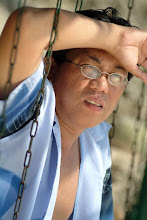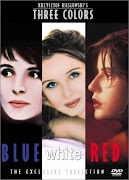
NOW I KNOW what a libertine would feel in a harem. It was a bibliomaniac's wet dream come true when the public library of Shawnee County and Topeka (capital city of Kansas) hauled out its slightly-used books--hardcover and paperback--to the sprawling space of the Kansas ExpoCentre for its annual three-day book sale last month. Whoopee, indeed, as the books were unbelievably cheap (from as low as 25 cents to three dollars!).
Though it was an eye-popping affair taking one's pick from such an orgy of authors, the library's staff and volunteers made the whole shebang in so orderly a manner worthy of a monastery by arranging the books on separate tables according to various genres and classifications. And so despite the throng of readers, it was a breeze to navigate from one book section to another. It was a thrill on the last day of the book sale when all items were for the taking--get all you can--for only three dollars per sack! My wife also had a blast picking up books for our two kids and some health/home therapy manuals.
All in all, I spent only $27 for a stash of magazines (Harper's, National Geographic, Audubon, and Scientific American) and an entire bookcase of a hoard listed below:
Novels
- Paradise (Toni Morrison)
- The Blind Assassin (Margaret Atwood)
- Elective Affinities (Johann Wolfgang van Goethe)
- The Accidental Tourist (Anne Tyler)
- Breathing Lessons (Anne Tyler)
- Searching for Caleb (Anne Tyler)
- The Big Sky (A.B. Guthrie)
- A Sport of Nature (Nadine Gordimer)
- The Mission Song (John Le Carre)
- The Russia House (John Le Carre)
- The Mambo Kings Play Songs of Love (Oscar Hijuelos)
- The Story of Lucy Gault (William Trevor)
- Saturday (Ian McEwan)
- The Hours (Michael Cunningham)
- The Five People You Meet in Heaven (Mitch Albom)
Short Stories
- Cathedral (Raymond Carver)
Poetry/Criticism
- The Poet's World (Rita Dove)
Spirituality
- The Glorious Impossible: Illustrated with Frescoes by Giotto (Madeliene L' Engle)
- Finding God in the Garden: Backyard Reflections on Life, Love, and Compost (Rabbi Balfour Brickner)
Memoir/Biography
- Boyhood: Scenes From a Provincial Life (J.M. Coetzee)
- In the Company of Writers: A Life in Publishing (Charles Scribner)
- Another Life: A Memoir of Other People (Michael Korda)
- Makers of the Modern World: The Lives of Writers, Artists, Scientists, Philosophers, Composers, and Other Creators Who Formed the Pattern of Our Century (Louis Untermeyer, editor)
- War Letters: Correspondence From the American Civil War, World War I and II, the Cold War, Korea, Vietnam, the Persian Gulf, Somalia and Bosnia (Andrew Carroll, editor)
- Great Biographies: Elizabeth I, Charles Darwin, Martin Luther, Mark Twain, Charles Lindbergh, Florence Nightingale, Thomas Edison, Hans Christian Andersen, P.T. Barnum, Pearl S. Buck, Adolf Hitler, John Quincy and Louisa Adams (Reader's Digest series)
 Essays/Non-Fiction
Essays/Non-Fiction
- Arctic Dreams: Imagination and Desire in a Northern Landscape (Barry Lopez)
- A Stay Against Confucion: Essays on Faith and Fiction (Ron Hansen)
- A Circle of Quiet (Madeliene L'Engle)
- Face To Face: A Reader in the World (Lynne Sharon Schwartz)
- Enough's Enough... And Other Rules of Life (Calvin Trillin)
- At Large (Ellen Goodman)
- The Rising George: America's Master Humorist Takes on Everything from Monomania To Ernest Hemingway (S.J. Perelman)
References (Current Affairs, Religion, Nature, Food, Photography, etc.)
- Fruitcakes & Couch Potatoes and Other Delicious Expressions (Christine Ammer)
- The Faith: A History of Christianity (Brian Moynahan)
- A World of Ideas: Conversations With Thoughtful Men and Women About Life Today and the Ideas Shaping Our Future (Bill Moyers, editor)
- A World of Ideas II: Public Opinions From Private Citizens (Bill Moyers, editor)
- Genesis: A Living Conversation (Bill Moyers, editor)
- Into the Unknown: The Story of Exploration (The National Geographic Society, editor)
- Weird and Wonderful Wildlife (Martin/May/Taylor, editors)
Anthologies
- Modern American Poets: Their Voices and Visions (Robert Diyanni, editor)
- This Is My Best: America's 85 Greatest Living Authors Choose Their Best Work, and Explain Why They Have Selected It (Whit Burnett, editor)
- Treasury of Great Humor: Wit, Whimsy, and Satire From the Remote Past to the Present (Louis Untermeyer, editor)
- The Heath Introduction To Fiction (4th edition, edited by John Clayton)
- The Harper and Row Reader: Liberal Education Through Reading and Writing (Booth/Gregory, editors)
- Literature: An Introduction To Reading and Writing (4th edition, edited by Roberts/Jacobs)
- Best Newspaper Writing: Winners of the American Society Editors' Competition (Christopher Scanlan, editor)
- The Book of Virtues: A Treasury of Great Moral Stories (with commentaries by William Bennett, editor)
- The Bedford Introduction to Literature: Reading, Writing, Thinking (5th edition, edited by Michael Meyer)
- The Conscious Reader (8th edition)
- The Norton Reader: An Anthology of Expository Prose (9th edition, edited by Linda Peterson)
Though it was an eye-popping affair taking one's pick from such an orgy of authors, the library's staff and volunteers made the whole shebang in so orderly a manner worthy of a monastery by arranging the books on separate tables according to various genres and classifications. And so despite the throng of readers, it was a breeze to navigate from one book section to another. It was a thrill on the last day of the book sale when all items were for the taking--get all you can--for only three dollars per sack! My wife also had a blast picking up books for our two kids and some health/home therapy manuals.
All in all, I spent only $27 for a stash of magazines (Harper's, National Geographic, Audubon, and Scientific American) and an entire bookcase of a hoard listed below:
Novels
- Paradise (Toni Morrison)
- The Blind Assassin (Margaret Atwood)
- Elective Affinities (Johann Wolfgang van Goethe)
- The Accidental Tourist (Anne Tyler)
- Breathing Lessons (Anne Tyler)
- Searching for Caleb (Anne Tyler)
- The Big Sky (A.B. Guthrie)
- A Sport of Nature (Nadine Gordimer)
- The Mission Song (John Le Carre)
- The Russia House (John Le Carre)
- The Mambo Kings Play Songs of Love (Oscar Hijuelos)
- The Story of Lucy Gault (William Trevor)
- Saturday (Ian McEwan)
- The Hours (Michael Cunningham)
- The Five People You Meet in Heaven (Mitch Albom)
Short Stories
- Cathedral (Raymond Carver)
Poetry/Criticism
- The Poet's World (Rita Dove)
Spirituality
- The Glorious Impossible: Illustrated with Frescoes by Giotto (Madeliene L' Engle)
- Finding God in the Garden: Backyard Reflections on Life, Love, and Compost (Rabbi Balfour Brickner)
Memoir/Biography
- Boyhood: Scenes From a Provincial Life (J.M. Coetzee)
- In the Company of Writers: A Life in Publishing (Charles Scribner)
- Another Life: A Memoir of Other People (Michael Korda)
- Makers of the Modern World: The Lives of Writers, Artists, Scientists, Philosophers, Composers, and Other Creators Who Formed the Pattern of Our Century (Louis Untermeyer, editor)
- War Letters: Correspondence From the American Civil War, World War I and II, the Cold War, Korea, Vietnam, the Persian Gulf, Somalia and Bosnia (Andrew Carroll, editor)
- Great Biographies: Elizabeth I, Charles Darwin, Martin Luther, Mark Twain, Charles Lindbergh, Florence Nightingale, Thomas Edison, Hans Christian Andersen, P.T. Barnum, Pearl S. Buck, Adolf Hitler, John Quincy and Louisa Adams (Reader's Digest series)
 Essays/Non-Fiction
Essays/Non-Fiction- Arctic Dreams: Imagination and Desire in a Northern Landscape (Barry Lopez)
- A Stay Against Confucion: Essays on Faith and Fiction (Ron Hansen)
- A Circle of Quiet (Madeliene L'Engle)
- Face To Face: A Reader in the World (Lynne Sharon Schwartz)
- Enough's Enough... And Other Rules of Life (Calvin Trillin)
- At Large (Ellen Goodman)
- The Rising George: America's Master Humorist Takes on Everything from Monomania To Ernest Hemingway (S.J. Perelman)
References (Current Affairs, Religion, Nature, Food, Photography, etc.)
- Fruitcakes & Couch Potatoes and Other Delicious Expressions (Christine Ammer)
- The Faith: A History of Christianity (Brian Moynahan)
- A World of Ideas: Conversations With Thoughtful Men and Women About Life Today and the Ideas Shaping Our Future (Bill Moyers, editor)
- A World of Ideas II: Public Opinions From Private Citizens (Bill Moyers, editor)
- Genesis: A Living Conversation (Bill Moyers, editor)
- Into the Unknown: The Story of Exploration (The National Geographic Society, editor)
- Weird and Wonderful Wildlife (Martin/May/Taylor, editors)
Anthologies
- Modern American Poets: Their Voices and Visions (Robert Diyanni, editor)
- This Is My Best: America's 85 Greatest Living Authors Choose Their Best Work, and Explain Why They Have Selected It (Whit Burnett, editor)
- Treasury of Great Humor: Wit, Whimsy, and Satire From the Remote Past to the Present (Louis Untermeyer, editor)
- The Heath Introduction To Fiction (4th edition, edited by John Clayton)
- The Harper and Row Reader: Liberal Education Through Reading and Writing (Booth/Gregory, editors)
- Literature: An Introduction To Reading and Writing (4th edition, edited by Roberts/Jacobs)
- Best Newspaper Writing: Winners of the American Society Editors' Competition (Christopher Scanlan, editor)
- The Book of Virtues: A Treasury of Great Moral Stories (with commentaries by William Bennett, editor)
- The Bedford Introduction to Literature: Reading, Writing, Thinking (5th edition, edited by Michael Meyer)
- The Conscious Reader (8th edition)
- The Norton Reader: An Anthology of Expository Prose (9th edition, edited by Linda Peterson)






































































































